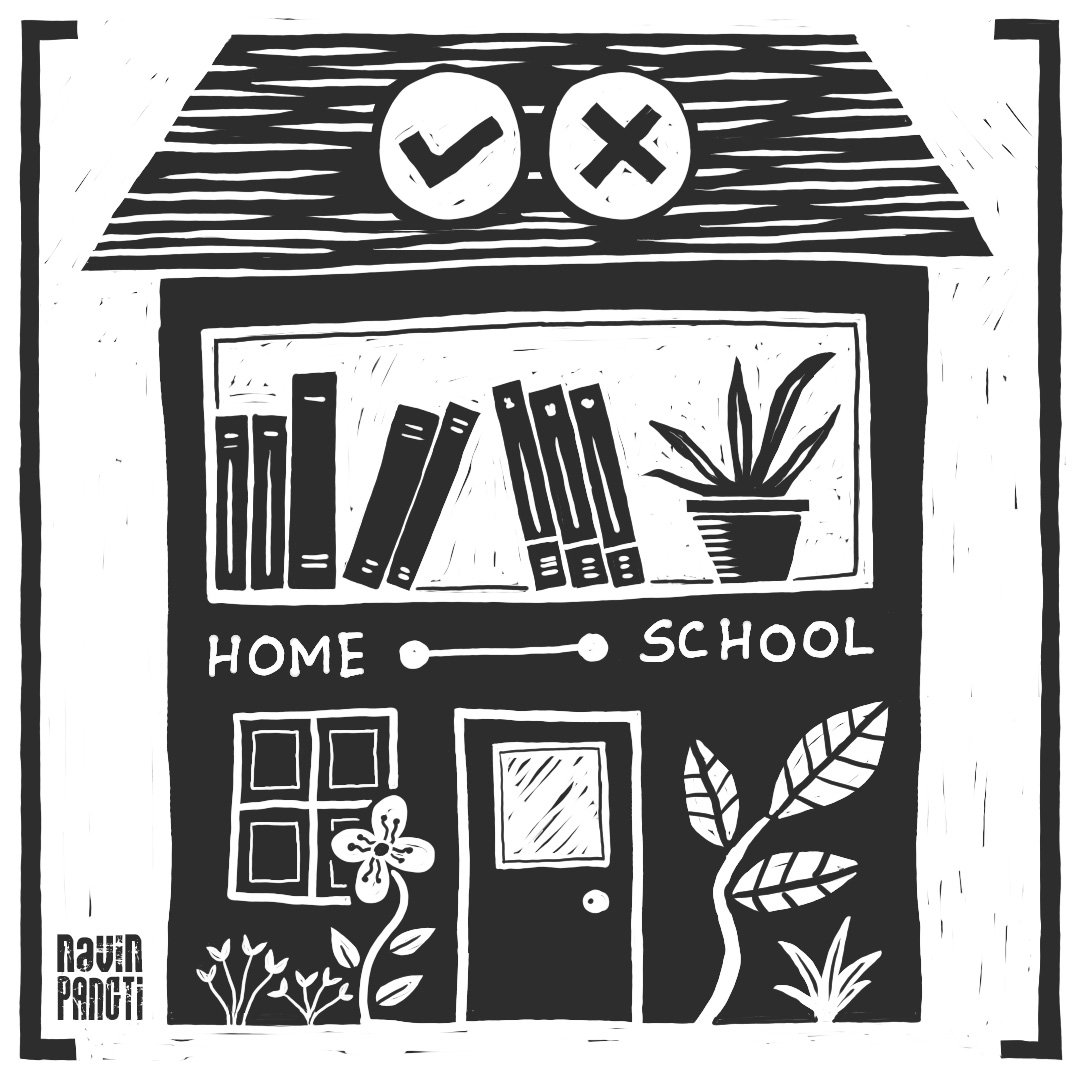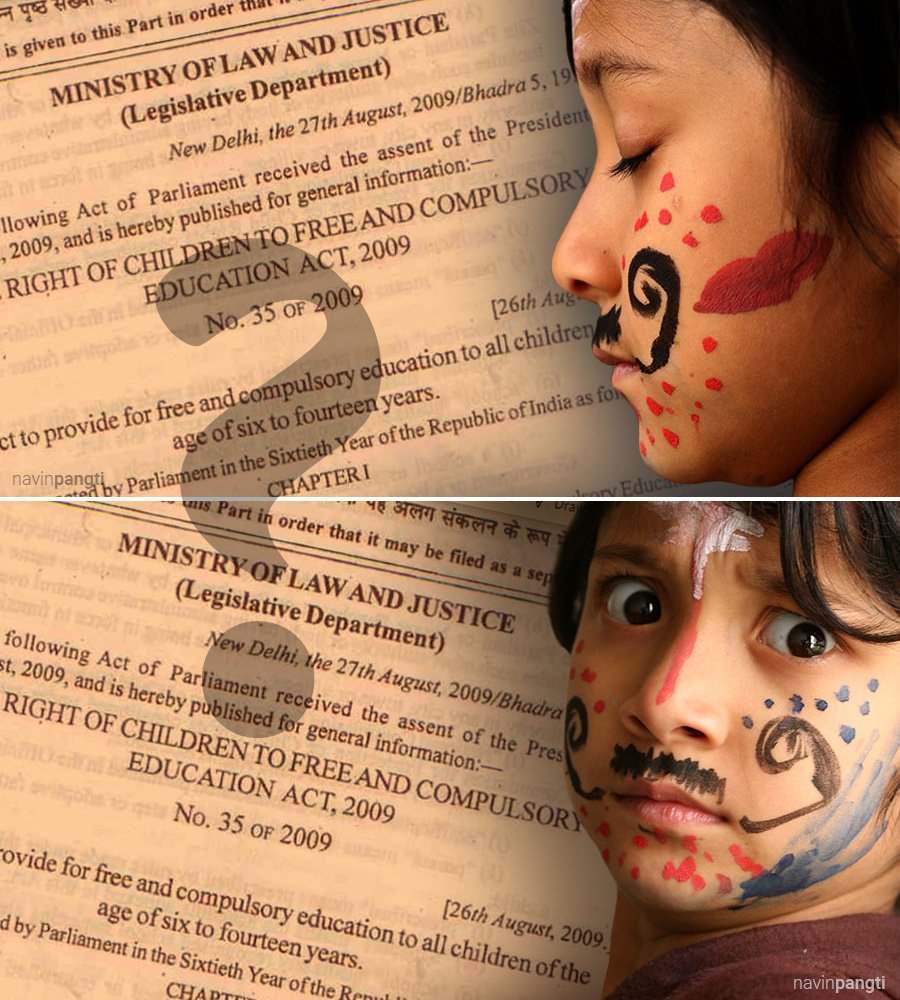Is homeschooling legal?
The question about legality of homeschooling is matter of concern for many parents. This issue was not relevant until the RTE Act was enacted in 2009. Let us explore the provisions of the bill to understand the legality of the matter.

RTE stands for Right to Free and Compulsory Education Act. The RTE Act defines itself as “An Act to provide for free and compulsory education to all children of the age of six to fourteen years.” There are four key terms in this statement – Right, Free, Compulsory and Education, which can be understood as follows –
Education is a RIGHT – The act establishes education one of the seven fundamental rights. Right is a legally guaranteed power provided to a citizen.
It is to be FREE – What this means is that non-availability of resources cannot be a cause for a child to not have access to quality education. Here quality means education of specified standard, provision of specified infrastructure, adequate pupil teacher ratio and quality teachers. The term ‘free’ covers for direct expenses like school fees and indirect costs like uniforms, textbooks, mid-day meals, transportation, etc.
It is COMPULSORY – This is the tricky term. After going through the entire act and understanding its essence, my view is that it primarily stands for guarantee of access. It is a compulsory obligation for the state to provide education of specified quality. Though the explanation provided with point 8, Chapter III of the act states that – “The term “compulsory education” means obligation of the appropriate government to (i) provide free elementary education to every child of the age of six to fourteen years; and (ii) ensure compulsory admission, attendance and completion of elementary education by every child of the age of six to fourteen years.”
It is about EDUCATION – This is even trickier. What does one mean by ‘education’? Does this only mean formal schooling? Or do other means of learning also legally qualify as ‘education’? How does one quantify ‘elementary education’ that needs to be essentially provided?
The act goes on to define the obligation of the state to ensure universal access to education. Universal access to education means easy and free access to neighbourhood schools of specified standards. Some of these standards are:
- Pupil Teacher Ratio of 30:1
- Teacher vacancies not to exceed 10% of the sanctioned strength
- All schools to have teaching & learning materials, library and play & sports equipment
- School buildings to be fit for all weather conditions, have barrier-free access, have boundary walls, one classroom for every teacher, separate room for head teacher, separate toilets, safe drinking water, kitchen for mid-day meal and playground
By easy and free access, the Act means –
- Neighbourhood school should be within 1 Km range for children in class 1 to 5 and 3 Kms range for children in class 6 to 8
- No capitation can be charged by any school, government or private
- Prohibition on use of any screening procedures for admissions
- No child can be refused admission in school, anytime of the year. Even without a transfer certificate. And even if the child has never attended school before
- Child has to be enrolled in a class ‘appropriate to his/her age’
- It is the responsibility of the government/school to provide the child with ‘special training’ to enable him/her to come up to his/her age appropriate class, if the child is not able to cope up with studies due to delayed enrolment
Apart from these, the act also mandates making at least 25% of the seats free for children from disadvantaged and weaker sections of society, commonly referred to as EWS. It also states that teachers are prohibited to give private tuition or engage in private teaching activity.
While going through this laundry list, one can easy conclude that we are still years, or maybe decades, away from fulfilling these basic provisions of the act. Even after so many years most of these provisions are being violated right under the noses of the administration.
To meet these objectives, the Act also defines various roles of the government.
- Role of Central government
- Development of National Curriculum Framework
- Development and enforcement of standards for teacher qualification and training
- Providing resources to the states for innovation, research, planning and capacity building
- Role of State government
- Provision of free and compulsory elementary education to all children
- Ensuring availability of a neighbourhood school of requisite standard
- Ensuring quality education conforming to standards specified in the Act
- Ensure admission, attendance and completion of elementary education for all
- Prevent discrimination against any child on any grounds
- Role of Local Authorities
- Maintenance of records of all children up to the age of 14 years
- Ensuring admission of all children, including migrant children
- Ensuring that no child is discriminated against
- Managing the academic calendar
- Monitoring functioning of schools in its jurisdiction
Out of all these, the role of the Local Authority to maintain records is of concern to the homeschoolers. The Act reads this duty of Local Authority as –
Maintenance of records of children by local authority for the purposes of clause (d) of section 9 – Class in which the child is studying (for children between age 6-14), and if education is discontinued in the territorial jurisdiction of the Local Authority, the cause of such discontinuance;
Due to this provision of the act, the local authority may approach the homeschoolers. They can request you to send your children to school. And if they fail to convince you, all they have to do is record the cause of discontinuance. Nowhere does the Act state anything else on this matter. There are no provisions to escalate the matter or initiate any penal action.

Technically, if something is illegal and is stated to a crime then it is accompanied with a remedy or other legal provisions to undo or punish the wrong. As there are no penalties on parents for not sending their children to school and neither are there any other remedies, there seems to be no illegality in the option to homeschool one’s child.
To understand this further, let us delve into the genesis of RTE. RTE was an outcome of Children’s Bill of Rights, 1989. This international bill contains all the rights which children have all over the world. Government of India signed this document in 1992. This bill of rights was triggered by The Universal declaration of Human Rights, 1989. A separate bill of rights for children was drafted because a need was felt to discuss the rights of children independently.
With regards to family, the Children’s Bill of Rights states that –
- Family is the fundamental group of society
- Family is the natural environment for the growth and well-being of its members, particularly children
- Parents or, as the case may be, legal guardians, have the primary responsibility for the upbringing and development of the child. The best interests of the child will be their basic concern
- Every child has the Right to a good education, and everyone has the Responsibility to encourage all children to go to school
Regarding the role of state, the bill says that –
- States are obliged to support and respect parents’ primary responsibility for providing care and guidance for their children
- States are also obliged to prevent children from being separated from their families unless the separation is necessary for the child’s best interests
- States shall respect the rights and duties of the parents to provide direction to the child in the exercise of his or her right in a manner consistent with the evolving capacities of the child
- If the laws of a particular country protects children better than the articles of the Convention, then those laws should override the Convention
This clearly means that informed choice of a family with regards to a child should be respected by the state. If the child is forced to homeschool in an abusive environment then it is a different matter altogether.
The point of view in the article 26 of the Universal Declaration of Human Rights also delves in to the matter. It states that-
- Everyone has the right to education. Education shall be free, at least in the elementary and fundamental stages. Elementary education shall be compulsory.
- Education shall be directed to the full development of the human personality and to the strengthening of respect for human rights and fundamental freedoms. It shall promote understanding, tolerance and friendship among all nations, racial or religious groups, and shall further the activities of the United Nations for the maintenance of peace.
- Parents have a prior right to choose the kind of education that shall be given to their children.
So, as per the international agreements and declarations, to which India is a signatory, the issue to parental role in education of the child is amply clear. Even from the point of view of natural justice, this line of argument holds water. Though it is a different matter altogether that local courts are not obliged to conform to the international treaties and bills. They can settle an issue primarily on the basis of interpretation of a local law.
So what do we conclude?
RTE is about the obligations of the state and not the parent. It is primarily about providing quality elementary education, universally!
RTE is completely silent on homeschooling. It does not state that homeschooling is legal. But it also does not state it to be an illegal proposition. What is amply clear is that not sending a child to school is not unlawful but not providing access to ‘quality’ school is!
And if, as a homeschooler, you are still worried about legality, all I can say is that the Government has far more critical issues to handle than homeschoolers! As for us, we would have anyways undertaken this journey anyways – legal or illegal!
Bon Voyage!















Great content.
Does the act categorically define what a ‘school’ is meant to be ?
If a home environment is able to meet all the quality standards listed in the act for schools, then the parents may as well argue for the ‘home’ to be a ‘school’.
It would then be for the authorities to validate if the standards are being met .
Going through the details in this post, seems to be a good case for having a good lawyer as a good friend 🙂
yes, it defines all the infrastructural details, teacher quality, number of hours of learning per day and per annum, etc. by the way, i finished my law last year. though i do not intend to get into practice 🙂
Most of Knowledge may be practiced much better without getting into its ‘Practice’ 🙂
With all the confounding legalese around RTE, there seems a healthy excuse with any homeschooler for having missed the government’s noble intentions … :-))